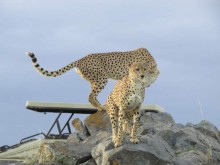Private guides and guided tours in Kenya
Private guides in Kenya
Private Guide in Nairobi - African
(Member Since 2005) Excursions/tous in the following cities: Nairobi Languages: EnglishIncorporated in 1990 as a limited liability company, with a single office and five dedicated personnel, we today have six offices, over a hundred dedicated travel professionals and a turnover exceeding USD 9.00 million in the year 2000. Our rapid growth however has not let us loose sight of our single-minded obsession of "Total Customer Satisfaction".
Private Guide in Nairobi - Allison
(Member Since 2014) Languages: EnglishI am a Kenyan by registration - minded travel entrepreneur with a wealth of experience in traveling all over East Africa and in depth in Kenya. As a tour operator and as a guide I've led numerous individuals and groups from more than 10 countries Kenya inclusive. Kenya is a unique and mysterious country, with more than 40,000,000 people with the current speedy population growth surely a unique thing.
Private Guide in Nairobi - Antony
(Member Since 2008) Excursions/tous in the following cities: Nairobi Languages: EnglishAm a Qualified Tourguide with a Diploma in Tourguding and Administration Knowledgible in Wildlife & Birdlife Services - Birdwatching Safaris Wildlife Safaris Mountain Climbing Walking...

Kenya
Language: English
Currency: Kenyan shilling (KES)
Calling Code: +254
CAPITAL CITY OF Kenya: Nairobi
LANGUAGE OF Kenya: English
CURRENCY OF Kenya: Kenyan shilling (KES)
COMMENTS ABOUT Kenya:
The Republic of Kenya is a country in Eastern Africa.
Cities : Nairobi, Garissa, Kisumu, Lamu, Meru, Mombasa, Nakuru, Nyeri
Best Places : Aberdare National Park, Amboseli National Park, Lake Nakuru, National Park, Masai Mara National Park, Mount Kenya National Park, Mount Elgon National Park, Nairobi National Park, Meru National Park, Samburu National Park, Sibiloi National Park, Tsavo East National Park, Tsavo West National Park, African National Parks
Electricity : 240V/50Hz (UK plug) Calling code : +254 Time zone : EAT (UTC+3)
Founding president and liberation struggle icon Jomo KENYATTA led Kenya from independence until his death in 1978, when President Daniel Toroitich arap MOI took power in a constitutional succession. The country was a de facto one-party state from 1969 until 1982 when the ruling Kenya African National Union (KANU) made itself the sole legal party in Kenya. MOI acceded to internal and external pressure for political liberalization in late 1991. The ethnically fractured opposition failed to dislodge KANU from power in elections in 1992 and 1997, which were marred by violence and fraud, but are viewed as having generally reflected the will of the Kenyan people. President MOI stepped down in December of 2002 following fair and peaceful elections. Mwai KIBAKI, running as the candidate of the multiethnic, united opposition group, the National Rainbow Coalition, defeated KANU candidate Uhuru KENYATTA and assumed the presidency following a campaign centered on an anticorruption platform.
CLIMATE OF Kenya: Kenya enjoys a tropical climate. It is hot and humid at the coast, temperate inland and very dry in the north and northeast parts of the country.
RELIGION OF Kenya: Protestant 45%, Roman Catholic 33%, indigenous beliefs 10%, Muslim 10%, other 2%. a large majority of Kenyans are Christian, but estimates for the percentage of the population that adheres to Islam or indigenous beliefs vary widely
POPULATION OF Kenya: 32,021,856 estimates for this country explicitly take into account the effects of excess mortality due to AIDS; this can result in lower life expectancy, higher infant mortality and death rates, lower population and growth rates, and changes in the distribution of population by age and sex than would otherwise be expected (July 2004 est.)>>>>
ECONOMY OVERVIEW OF Kenya: The regional hub for trade and finance in East Africa, Kenya has been hampered by corruption, notably in the judicial system, and by reliance upon several primary goods whose prices have remained low. In 1997, the IMF suspended Kenya's Enhanced Structural Adjustment Program due to the government's failure to maintain reforms and curb corruption. A severe drought from 1999 to 2000 compounded Kenya's problems, causing water and energy rationing and reducing agricultural output. As a result, GDP contracted by 0.2% in 2000. The IMF, which had resumed loans in 2000 to help Kenya through the drought, again halted lending in 2001 when the government failed to institute several anticorruption measures. Despite the return of strong rains in 2001, weak commodity prices, endemic corruption, and low investment limited Kenya's economic growth to 1.2%. Growth lagged at 1.1% in 2002 because of erratic rains, low investor confidence, meager donor support, and political infighting up to the elections. In the key 27 December 2002 elections, Daniel Arap MOI's 24-year-old reign ended, and a new opposition government took on the formidable economic problems facing the nation. In 2003, progress was made in rooting out corruption, and encouraging donor support, with GDP growth edging up to 1.7%.



 French
French Spanish
Spanish Russian
Russian








































































































